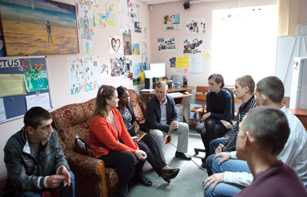
UNAIDS PCB delegation visiting a drop-in centre for people who use drugs and other key populations being implemented by the NGO Convictus in Kiev. 5 October 2012.
Credit: UNAIDS
Representatives from the UNAIDS Programme Coordinating Board (PCB) visited Ukraine from 4-5 October to learn about its National AIDS Programme and to experience first-hand the progress made and the challenges remaining in the country’s AIDS response. This was the first visit of the UNAIDS governing body to the Eastern Europe and Central Asia region.
The PCB delegation met with the Vice-Prime Minister and Minister of Health of Ukraine, Dr Raisa Bogatyryova, as well as with other government officials, development partners, civil society and community representatives—including members of national and regional networks of people living with HIV—and with the UN Country Team and the Joint Team on AIDS.
The meeting with Dr Bogatyryova offered an opportunity to discuss the concept of shared responsibility and to explore ways in which domestic financing could be strengthened.
The Ukrainian Government has increased the domestic investments for HIV by 10-fold (between 2005 and 2010), and has succeeded in increasing external financing especially for HIV prevention, care and support programmes for key populations. Yet, 50% of the country’s AIDS response remains dependent on donor financing.
“The current situation in Ukraine is confirming the importance of the country’s decision for the state leadership and accountability in our joint fight against HIV,” said the Vice-Prime Minister Bogatyryova. “We are committed to further scale up HIV treatment and prevention in Ukraine with a new national AIDS strategy for the next five years,” she added.
The Delegation and the Vice-Prime Minister talked about the need to scale up HIV prevention and treatment services as the current HIV treatment programme in the country is meeting the needs of only 25% of people eligible. They also highlighted the importance of creating an enabling environment to facilitate access to HIV services to key populations at higher risk of infection such as sex workers, people who use drugs and men who have sex with men.
The current situation in Ukraine is confirming the importance of the country ownership and state leadership in our joint AIDS response
Vice-Prime Minister and Minister of Health of Ukraine, Dr Raisa Bogatyryova
Ukraine is experiencing the most severe HIV epidemic in Eastern Europe with an estimated 230 000 people living with HIV. Injecting drug use remains the leading cause of HIV infection in the country, with an HIV prevalence of 21.5 % among people who inject drugs.
The members of the Delegation had the opportunity to visit several health facilities to see the work being done on the ground. In the Kiev city AIDS clinic, for example, the government and civil society partners are providing services for people living with HIV and people who use drugs—including HIV and TB treatment, substitution maintenance therapy (SMT) and psychological support. Also in Kiev, the Lavra Clinic, is a specialised medical facility that provides clinical care to HIV-positive patients, and has a drop-in community centre which offers HIV testing, prevention and care for people who use drugs, sex workers and transgender people.
The delegation also interacted with women at the maternity clinic of the Kiev City Center of Reproductive Health and Perinatology, which provides services to stop new HIV infections among children as well as substitution maintenance therapy to pregnant women who also use drugs. They also talked to the service providers (medical professionals, psychologists, outreach and social workers, and volunteers) to learn more about their activities and challenges they face.
Efforts to stop new HIV infections among children and keeping their mothers alive have yielded positive results in Ukraine where 96% of pregnant women living with HIV received antiretroviral prophylaxis in 2011. Mother-to-child transmission of HIV was reduced from 28% in 2001 to 4.7% in 2009.
Throughout the visit, the delegation highlighted the key role played by civil society organizations in advocating for, and providing HIV services for key populations, care and support to people living with HIV, and in reducing stigma and discrimination towards affected communities.

PCB delegates with the UN Country Team and Joint Team on AIDS in Ukraine at the UN House in Kiev. 5 October 2012.
Credit: UNAIDS
“I have seen civil society in action in this region and I must say that it is particularly strong in Ukraine. The partnership between civil society organizations and national and local governments is essential in order to further scale up and sustain HIV services for the most vulnerable populations in Ukraine,” said Matt Southwell, the PCB NGO representative for Europe.
“The PCB field visit to Ukraine was an excellent opportunity to expose the delegation to the particular challenges of one of UNAIDS high impact countries and the most severe epidemic in Europe,” said Jan Beagle, UNAIDS Deputy Executive Director, Management and Governance. “The members of the delegation were also able to witness the critical role of UNAIDS in leading the Joint UN Team with the support of the Resident Coordinator and UN Country Team.”
The PCB delegation was composed of the Deputy Minister of Health of Poland and PCB Chair, the PCB Vice Chair from India, delegates from the United States of America, United Kingdom, Togo, the Islamic Republic of Iran and El Salvador, the European NGO constituency, three UNAIDS cosponsoring agencies (WHO, UNODC, UNFPA), and the UNAIDS Deputy Executive Director, Management and Governance.





